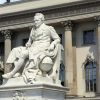The “Iranian Modernity” cultural programme
Until early March 2017, Iranian and German philosophers, artists and culture professionals in Berlin will be offering insights into the Iranian art, music and literary scene.

What is actually meant by modernity? Anyone who engages with this question will find that there can be many different answers. In Western states people often imagine that there is one European concept of modernity that is universally applicable. Yet the term can have very different meanings depending on the language, culture and society in which it is used. This is something that was also emphasised by the Iranian philosopher Hossein Mesbahian at the launch of the “Iranian Modernity” cultural programme in Berlin. “Modernity is a phenomenon that is open to different interpretations”, according to Mesbahian. That is why he is in favour of a plural understanding of modernity that includes different concepts in different societies.
Art, music, literature
The discussion session at Freie Universität Berlin marked the start of the “Iranian Modernity” cultural programme. Until early March, Iranian and German philosophers, artists and culture professionals will be offering insights into the Iranian art, music and literary scene in a series of lectures, readings and concerts. This will present a wide-ranging interpretation of contemporary culture in Iran. The programme is being organised by the Goethe-Institut in close cooperation with partners such as the Literarisches Colloquium Berlin, the CTM Festival and Freie Universität Berlin. “The intensive encounters, open discourse and diversity of artistic forms of expression for which the work of the Goethe-Institut abroad stands will provide audiences in Berlin with new insights into a multifaceted country”, remarked Goethe-Institute Secretary-General Johannes Ebert. The cultural programme is being funded by Germany’s Federal Foreign Office.
Fascinating discussions
Mahmud Doulatabadi, one of the most important writers of modern Iranian literature, will be coming to Berlin on 18 February 2017. He will be talking to the journalist Iris Radisch about his new volume of stories on the subject of refugees and migration. Mahmud Doulatabadi, one of the most important writers of modern Iranian literature, will be coming to Berlin on 18 February 2017. He will be talking to the journalist Iris Radisch about his new collection of short stories on the subject of refugees and migration. On 22 February, Amir Hassan Cheheltan and Shahryar Mandanipur, two of the leading representatives of Iranian contemporary literature, will be reading from their new and as yet unpublished books. Both authors have won numerous awards for their writing, yet their own work has to some extent become alien to them: Shahryar Mandanipur has not visited Iran for years, and wrote his novel “Censoring an Iranian Love Story” abroad. Amir Hassan Cheheltan’s novel “Der Kalligraf von Isfahan” (i.e. The Calligrapher of Isfahan) has also not been published in Farsi despite the fact that Cheheltan lives and writes in Iran.
The young author Nora Bossong and the poet Jan Wagner will be reporting on their impressions, misunderstandings and experiences in Iran at the Literarisches Colloquium Berlin on 1 March. Neither of them went to Iran “just like that”, but instead were invited as writers. They gave readings and met with colleagues and culture professionals. They talk to the translator Mahmoud Hosseini about whether their books and texts had any impact and about whether they now write differently. Zad has played a major part in ensuring that authors such as Judith Hermann, lngo Schulze, Uwe Timm, Peter Stamm and Julia Franck are accessible to Iranian readers, and was awarded the Goethe Medal in 2013 for his work as a cultural mediator in literature, theatre and film.
Events of the “Iranian Modernity” cultural programme
German Iranians with a passion for start-ups
“There is very great interest”
© www.deutschland.de

